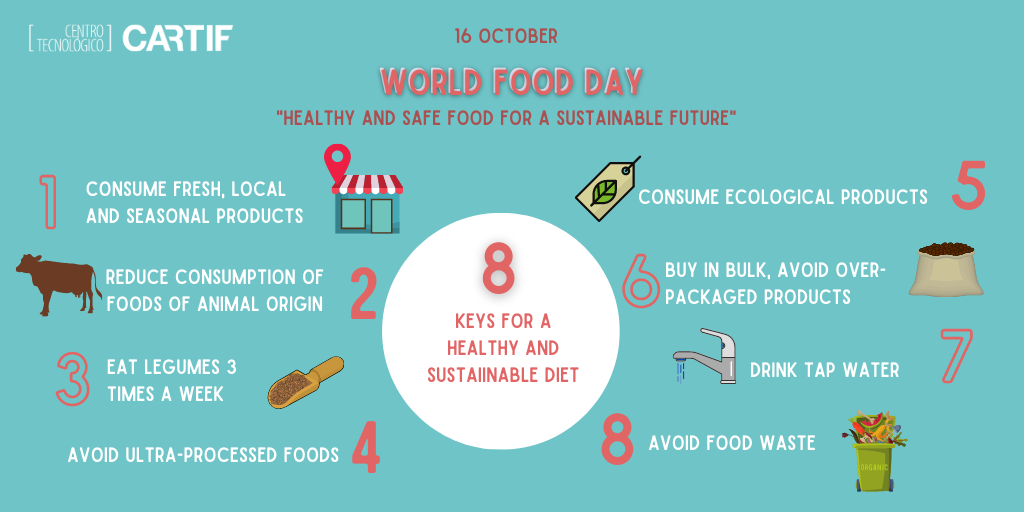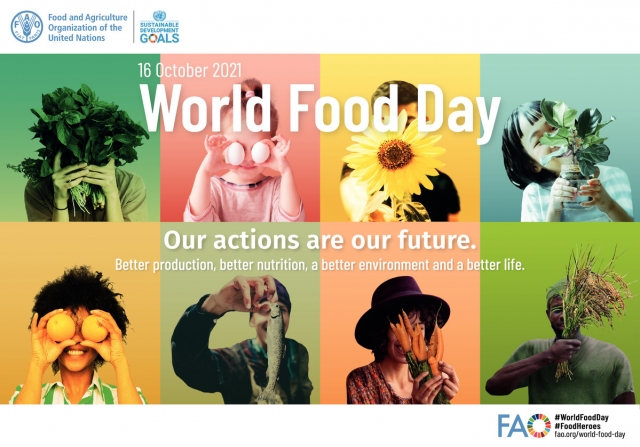The theme that the World Food and Agriculture Organization of the United Nations (FAO) has given to the World Food Day of this year 2021 is “Our actions are our future”.
And so it is, like everything in life, each step and each action that we undertake, determines our future. We,all of us, are an active and responsible part of a complex, living and moldable system called food system.
FAO defines food systems as a set of actors and the relationship of the set of activities established between all of them through the different interrelationships that make possible the production, transformation, distribution and consumption of the food.
The elements that make up food systems are multiple and integrate both aspects of the production, storage, processing, packaging and logistics as well as issues related to quality, nutritional, safety and price related aspects, even issues such as information and behavior of the consumers. Given all these factors- and many others!- and their interrelationship, it is not unreasonable to think that food systems are of crucial importance to many of the challenges and goals we must address globally, inlcuding the Sustainable Development Goals (SDGs). Among these objectives, and particularly two of them, are those aimed at achieving “Zero Hunger” (SDG2) and “End Poverty” (SDG1) on which we must place special emphasis today.
Most of the current food systems are not capable of adapting, anticipating or being resilient to stressful situations or of supplying the present needs, in some cases, or to anticipate the needs of a growing population.
There is a clear need to transition to more inclusive, resilient and sustainable food systems
A sustainable food system integrates varied and sufficient, nutritious and safe food with a fair price for all, where there are no forms of malnutrition and no hungry. Policies and strategies are necessary, but also our personal contribution as active members of the system. Every time we choose foods, we make mutiple decisions and do our part towards our healthy, but also, more sustainable diet, which contributes to the restoration of natural resources. Towards an equitable trade, leading the way towards the eradication of poverty and malnutrition, thus protecting human rights.
On World Food Day, every October 16 since 1979,the collective action of a large number of countries is promoted to carry out events, communication and dissemination activities with the aim of promoting the need to eradicate hunger and guarantee healthy diets for all the members of this planet.

We must address challenges related to world population growth, climate change, diet-related diseases, depletion of natural resources and associated specific situations such as pandemics or natural disasters.
Each October 16 since 42 years ago, the Food and Agriculture Organization of the United Nations promotes the celebration of World Food Day.In this case under the slogan “OUR ACTIONS ARE OUR FUTURE”
The European Union proposed to address the challenge of food security and nutrition through research and development policies aimed at guaranteeing the future of our food systems so that they turn into more sustainable, resilient,responsible, inclusive, diverse and competitive within the FOOD 2030 strategy and it is intended to provide solutions to four major general priorities of the food systems:
- NUTRITION: ensuring healthy and sustainable diets.
- CLIMATE: achieve climate-smart and sustainable food systems that adapt the climate change.
- CIRCULARITY: reducing the use of resources and improving the efficiency of food systems, including zero food waste.
- INNOVATION: fostering sustainable and accessible food sharing for all communities, cities and rural areas, developing data-driven food and nutrition systems that meet societal needs.
At CARTIF we work in different pathways of intervention that allow us to advance in this direction, such as the shift to more sustainable and healthy diets, the identification and use of new sources of protein, reduction of food waste, food security or urban food systems.
In this sense, FUSILLI project (Fostering the Urban Food System transformation through Innovative Living Labs Implementation, funded by the European Union´s Horizon 2020 research and innovation programme) general aim is achieving an integrated and safe transition towards food systems in pan-European cities and their peri-urban areas by creating a sustainable urban food plan, with environmental, social and economic aspects that integrates actions in the four pillars of the FOOD 2030 strategy.
Yes, we hold the future of food in our hands. Each step that each of us takes in the right direction ensures food and nutrition for healthy and sustainable diets while maintaining the environment, our health, equity and social inclusion, and the economy. Be part of the change that you want to see.
- A better life and a better future; right to foods - 16 October 2024
- Food reformulation; a step forward, that it is possible - 21 May 2024
- World Food Day; with soul of water - 16 October 2023
